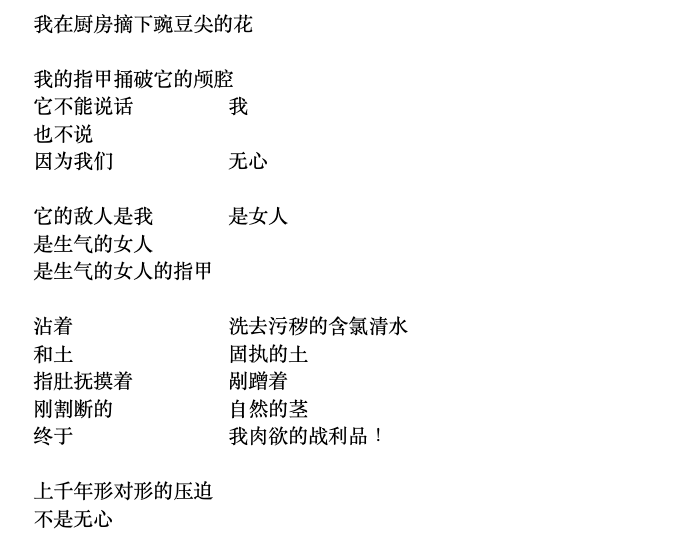Read “In the Kitchen I Pluck a Pea Flower,” Shiny Shuan-Yi Wu’s translation of《我在厨房摘下豌豆尖的花》


CREATIVE=WRITING=CREATIVE=TRANSLATION
Read Alexandra Mathew’s ‘Flavor’
Read 滋味, Xiao Liang’s translated excerpts of ‘Flavor’
Flavor is Alex’s reflection on people’s appropriation of Indian culture. She touches on many troubling practices such as generalizing spices, upturned noses, following certain trends without respecting or understanding Indian culture… I had a tentative translation but was not satisfied with it. But the process of translating it has been a really intentional effort at not “appropriating” the culture again in Chinese. It requires me to deal with this poem with care and respect.
For example, how to translate those really specific Indian cultural products/practices? “Garam Masala” is itself a rendering in English by pronunciation, then with Chinese, does the same approach still apply? There are two options actually: one is phonetic translation “葛拉姆玛萨拉,” while the other is “综合香辛料”(mixed spices). The latter isn’t really specific about Garam Masala, and is just as general. With “葛拉姆玛萨拉” there is an intentional difference being highlighted, because these characters clearly constitute a “foreign” name, so that it separates itself from the other generalizing, appropriating practices.
Same with “chakra,” there is also a phonetic translation “查克拉.” With regard to renderings more towards its meaning, the common translations are 脉轮(脉:vein, connection, network; 轮:wheel, cycle) and 气卦(气:qi, energy; 卦:symbols, but also appears in the famous Chinese “八卦”). Here I chose 脉轮 because it retains the “wheel” meaning in chakra and roughly capture the meaning (although there is definitely more research required). I didn’t choose 气卦 because the two Chinese characters automatically remind me of the concepts of 气 and 八卦 in Chinese metaphysics, which might risk appropriating it even again by associating it too closely with Chinese culture. What’s interesting is that there are three layers of culture contained in one translated poem. There’s the Indian culture the poet hopes to protect, the American “modern,” “trendy” culture being criticized, and then a translation produced in the Chinese language. Why should a Chinese translation of it exist? What responsibility is a Chinese translation of it burdened with? It really provokes some interesting questions for me to think about.